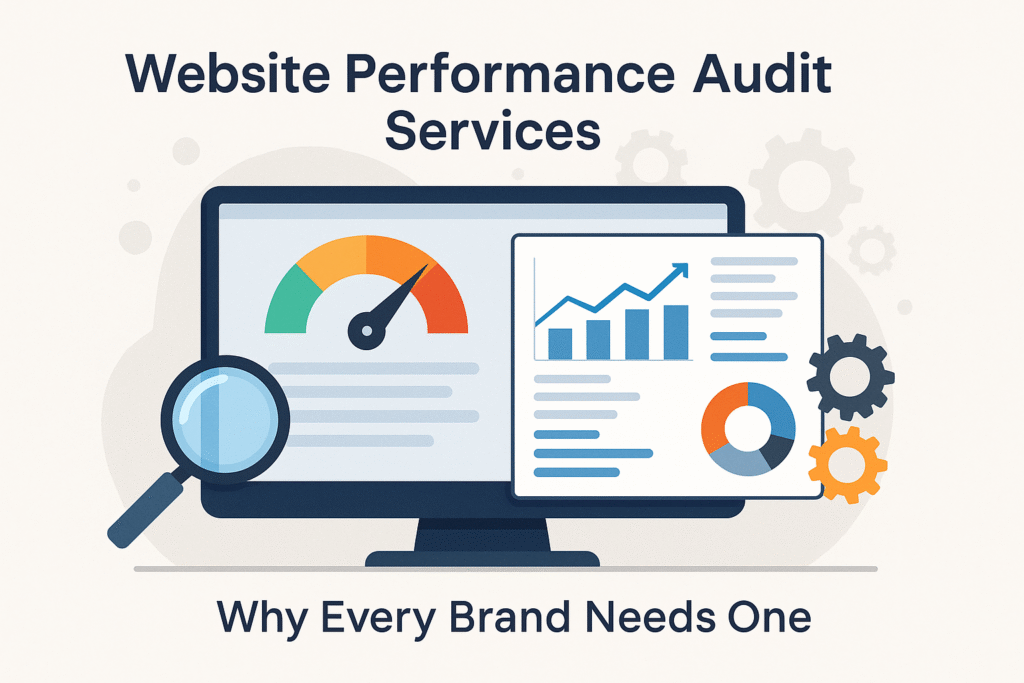
Introduction
In today’s digital environment, your website is often the first point of contact between your brand and potential customers. But what if it loads slowly, frustrates visitors or fails to convert? That’s where professional website performance audit services come in. They don’t just look nice—they dig into the technical foundation, user experience and SEO impact of your site. For brands serious about growth, every element matters. Let’s explore why every brand needs a performance audit service, what it covers and how to get the most value.
1. Why Website Performance Matters for Brands
- First impressions count. If your site takes too long to load or is difficult to navigate, many visitors leave before giving you a chance. A delay of even one extra second can reduce conversions significantly.
- Search engine implications. Page speed, mobile responsiveness and core performance metrics (like Lighthouse “Core Web Vitals”) are factors in how search engines evaluate sites.
- User experience drives brand perception. A site that performs well signals professionalism, reliability and trust—important for brand reputation.
- Performance affects conversion and retention. A site that loads and works quickly leads to happier users, better engagement and typically higher conversions.
2. What Website Performance Audit Services Cover
2.1 Technical Health & Speed
Audit services dive into:
- Page load speed, server response time, mobile performance.
- Code review, image/video optimization, caching, CDN (Content Delivery Network) usage.
- Crawlability, indexability and safe search practices.
2.2 User Experience & Engagement Metrics
- Mobile and desktop layout, navigation clarity, ease of use.
- Engagement signals: bounce rate, time on page, interaction.
- Accessibility, device variety and responsiveness.
2.3 Content & SEO Alignment
- Is your content structured for both users and search engines?
- Are pages serving the right intent and delivering value?
- Is your content slowing loading due to heavy assets or inefficient code?
2.4 Monitoring & Ongoing Performance
- Setting benchmarks and tracking performance over time (so you catch dips or spikes).
- Reporting and actionable recommendations that get prioritized and implemented.
3. Why Every Brand Needs This Service
- Competitive advantage. Many sites overlook this audit—so when you fix issues, you gain an edge.
- Risk mitigation. Poor performance can mean losing customers, ranking drops or reputational damage.
- Scalability. As traffic grows, site structure and performance must scale; audits ensure you’re ready.
- Investment protection. If you’re investing in content, ads, SEO or brand building, a lagging website undermines all of it.
4. How to Choose and Use a Website Performance Audit Service
- Define your goals first. What do you hope to achieve (better speed, mobile UX, conversions, ranking)?
- Check methodology. Does the service cover technical health, UX, content and performance benchmarks?
- Look for clear deliverables. A good audit provides a prioritized action list, not just a report.
- Plan for implementation. Audit findings are only as good as the fixes you make.
- Monitor progress. After fixes, re‑test and compare. Use tools like GTmetrix to track real user metrics.
5. Common Pitfalls & Mistakes to Avoid
- Doing an audit once and forgetting—performance must be monitored continuously.
- Fixing superficial issues without addressing root causes (e.g., fixing image size but ignoring server latency).
- Ignoring mobile and global audience performance—what works in one geography/device doesn’t guarantee global success.
- Focusing only on speed but ignoring UX or content relevance—speed alone isn’t enough.
Conclusion
A high‑performing website is a powerful brand asset—it fuels user satisfaction, search visibility and conversion. Website performance audit services help you uncover hidden bottlenecks, align your site with best practices, and transform your website into a growth instrument rather than a liability. If your brand is serious about digital success, make the audit step non‑negotiable.
FAQs
Q1. What is a website performance audit service?
It’s a comprehensive review of a website’s speed, usability, technical health, content and SEO impact—designed to pinpoint issues and provide a roadmap for improvement.
Q2. How quickly can I see results after an audit?
Some fixes—like image optimization or caching—can improve speed within days; longer‑term benefits like ranking or conversion gains may take weeks to months.
Q3. How often should I have a performance audit?
At minimum annually; if you update your site frequently, add new features, or serve global audiences, consider semi‑annual or quarterly audits.
Q4. Will an audit handle everything from speed to content?
A good audit covers a range of elements: technical performance, UX, content relevance, global/mobile performance and SEO alignment.
Q5. Does improving website performance really help SEO?
Yes—for reasons including faster load times, better mobile experience and improved engagement metrics, which all factor in how search engines evaluate sites.

